Organisational Behaviour Report: BBC Company, UK - Analysis & Insights
VerifiedAdded on 2020/06/05
|13
|4273
|44
Report
AI Summary
This report provides a comprehensive analysis of organizational behaviour within the British Broadcasting Corporation (BBC). It begins by examining the application of Handy's cultural typology to understand how power, politics, and culture influence individual behaviours within the company. The report then delves into different motivational theories, including content and process theories, and explores motivational tools and strategies to enhance employee engagement and performance. Furthermore, it investigates various types of teams within an organization, focusing on team development theories like Tuckman's model, and evaluates organizational theories to improve team performance and efficiency. The analysis covers the impact of politics, power, and culture on organizational behaviour, and concludes with an evaluation of the theories and concepts of organizational behaviour, providing valuable insights into improving sales and revenues.
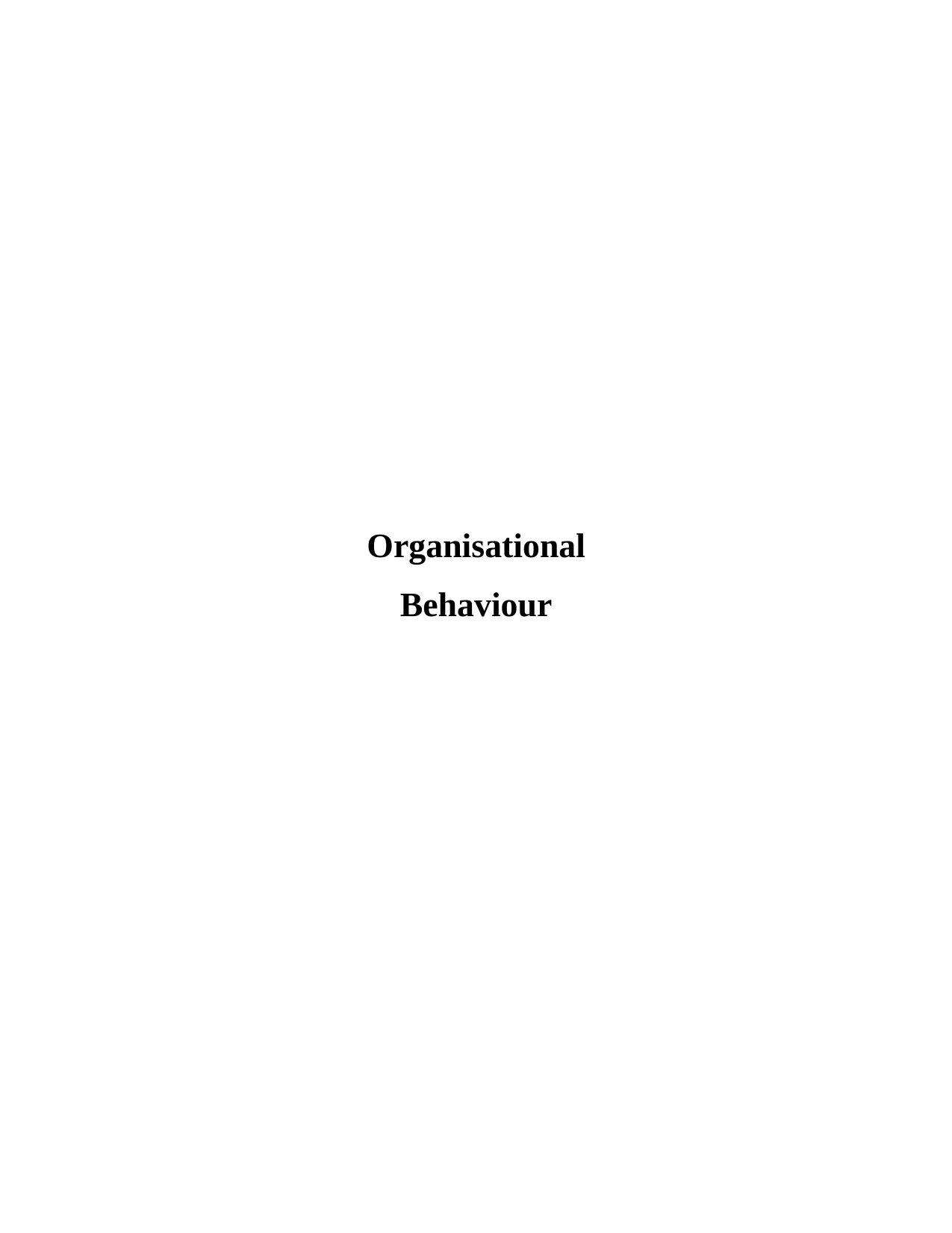
Organisational
Behaviour
Behaviour
Paraphrase This Document
Need a fresh take? Get an instant paraphrase of this document with our AI Paraphraser
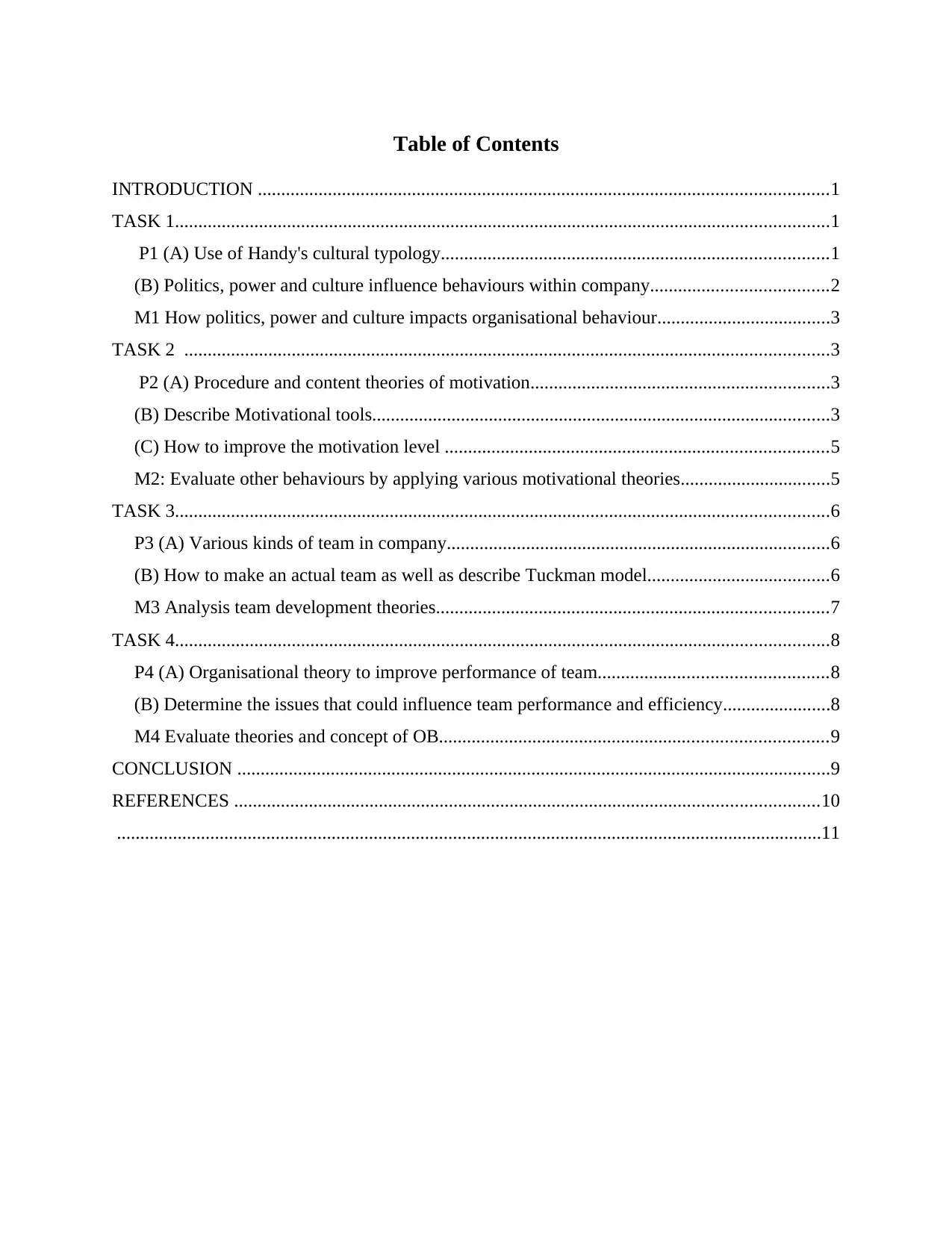
Table of Contents
INTRODUCTION ..........................................................................................................................1
TASK 1............................................................................................................................................1
P1 (A) Use of Handy's cultural typology...................................................................................1
(B) Politics, power and culture influence behaviours within company......................................2
M1 How politics, power and culture impacts organisational behaviour.....................................3
TASK 2 ..........................................................................................................................................3
P2 (A) Procedure and content theories of motivation................................................................3
(B) Describe Motivational tools..................................................................................................3
(C) How to improve the motivation level ..................................................................................5
M2: Evaluate other behaviours by applying various motivational theories................................5
TASK 3............................................................................................................................................6
P3 (A) Various kinds of team in company..................................................................................6
(B) How to make an actual team as well as describe Tuckman model.......................................6
M3 Analysis team development theories....................................................................................7
TASK 4............................................................................................................................................8
P4 (A) Organisational theory to improve performance of team.................................................8
(B) Determine the issues that could influence team performance and efficiency.......................8
M4 Evaluate theories and concept of OB...................................................................................9
CONCLUSION ...............................................................................................................................9
REFERENCES .............................................................................................................................10
.......................................................................................................................................................11
INTRODUCTION ..........................................................................................................................1
TASK 1............................................................................................................................................1
P1 (A) Use of Handy's cultural typology...................................................................................1
(B) Politics, power and culture influence behaviours within company......................................2
M1 How politics, power and culture impacts organisational behaviour.....................................3
TASK 2 ..........................................................................................................................................3
P2 (A) Procedure and content theories of motivation................................................................3
(B) Describe Motivational tools..................................................................................................3
(C) How to improve the motivation level ..................................................................................5
M2: Evaluate other behaviours by applying various motivational theories................................5
TASK 3............................................................................................................................................6
P3 (A) Various kinds of team in company..................................................................................6
(B) How to make an actual team as well as describe Tuckman model.......................................6
M3 Analysis team development theories....................................................................................7
TASK 4............................................................................................................................................8
P4 (A) Organisational theory to improve performance of team.................................................8
(B) Determine the issues that could influence team performance and efficiency.......................8
M4 Evaluate theories and concept of OB...................................................................................9
CONCLUSION ...............................................................................................................................9
REFERENCES .............................................................................................................................10
.......................................................................................................................................................11
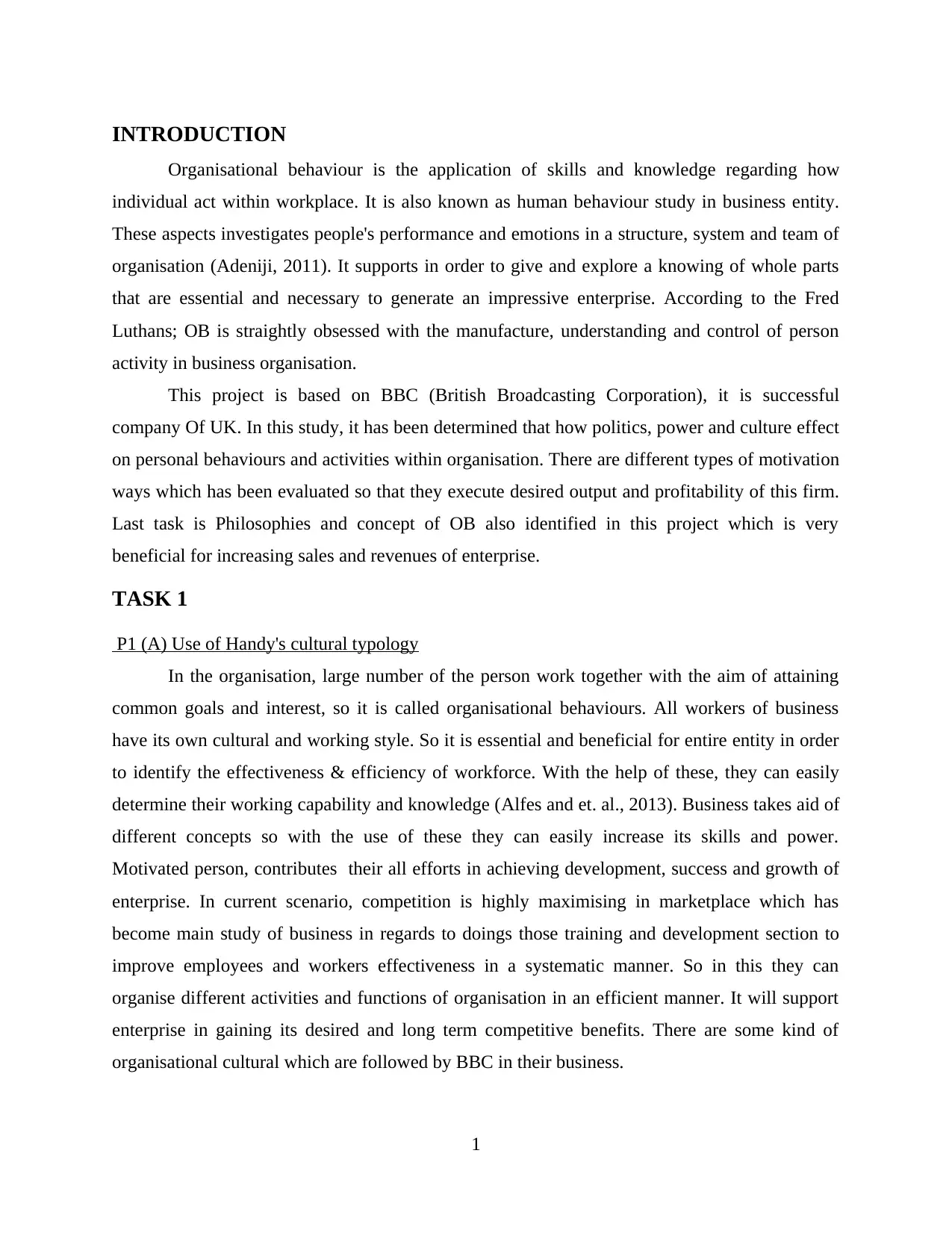
INTRODUCTION
Organisational behaviour is the application of skills and knowledge regarding how
individual act within workplace. It is also known as human behaviour study in business entity.
These aspects investigates people's performance and emotions in a structure, system and team of
organisation (Adeniji, 2011). It supports in order to give and explore a knowing of whole parts
that are essential and necessary to generate an impressive enterprise. According to the Fred
Luthans; OB is straightly obsessed with the manufacture, understanding and control of person
activity in business organisation.
This project is based on BBC (British Broadcasting Corporation), it is successful
company Of UK. In this study, it has been determined that how politics, power and culture effect
on personal behaviours and activities within organisation. There are different types of motivation
ways which has been evaluated so that they execute desired output and profitability of this firm.
Last task is Philosophies and concept of OB also identified in this project which is very
beneficial for increasing sales and revenues of enterprise.
TASK 1
P1 (A) Use of Handy's cultural typology
In the organisation, large number of the person work together with the aim of attaining
common goals and interest, so it is called organisational behaviours. All workers of business
have its own cultural and working style. So it is essential and beneficial for entire entity in order
to identify the effectiveness & efficiency of workforce. With the help of these, they can easily
determine their working capability and knowledge (Alfes and et. al., 2013). Business takes aid of
different concepts so with the use of these they can easily increase its skills and power.
Motivated person, contributes their all efforts in achieving development, success and growth of
enterprise. In current scenario, competition is highly maximising in marketplace which has
become main study of business in regards to doings those training and development section to
improve employees and workers effectiveness in a systematic manner. So in this they can
organise different activities and functions of organisation in an efficient manner. It will support
enterprise in gaining its desired and long term competitive benefits. There are some kind of
organisational cultural which are followed by BBC in their business.
1
Organisational behaviour is the application of skills and knowledge regarding how
individual act within workplace. It is also known as human behaviour study in business entity.
These aspects investigates people's performance and emotions in a structure, system and team of
organisation (Adeniji, 2011). It supports in order to give and explore a knowing of whole parts
that are essential and necessary to generate an impressive enterprise. According to the Fred
Luthans; OB is straightly obsessed with the manufacture, understanding and control of person
activity in business organisation.
This project is based on BBC (British Broadcasting Corporation), it is successful
company Of UK. In this study, it has been determined that how politics, power and culture effect
on personal behaviours and activities within organisation. There are different types of motivation
ways which has been evaluated so that they execute desired output and profitability of this firm.
Last task is Philosophies and concept of OB also identified in this project which is very
beneficial for increasing sales and revenues of enterprise.
TASK 1
P1 (A) Use of Handy's cultural typology
In the organisation, large number of the person work together with the aim of attaining
common goals and interest, so it is called organisational behaviours. All workers of business
have its own cultural and working style. So it is essential and beneficial for entire entity in order
to identify the effectiveness & efficiency of workforce. With the help of these, they can easily
determine their working capability and knowledge (Alfes and et. al., 2013). Business takes aid of
different concepts so with the use of these they can easily increase its skills and power.
Motivated person, contributes their all efforts in achieving development, success and growth of
enterprise. In current scenario, competition is highly maximising in marketplace which has
become main study of business in regards to doings those training and development section to
improve employees and workers effectiveness in a systematic manner. So in this they can
organise different activities and functions of organisation in an efficient manner. It will support
enterprise in gaining its desired and long term competitive benefits. There are some kind of
organisational cultural which are followed by BBC in their business.
1
⊘ This is a preview!⊘
Do you want full access?
Subscribe today to unlock all pages.

Trusted by 1+ million students worldwide
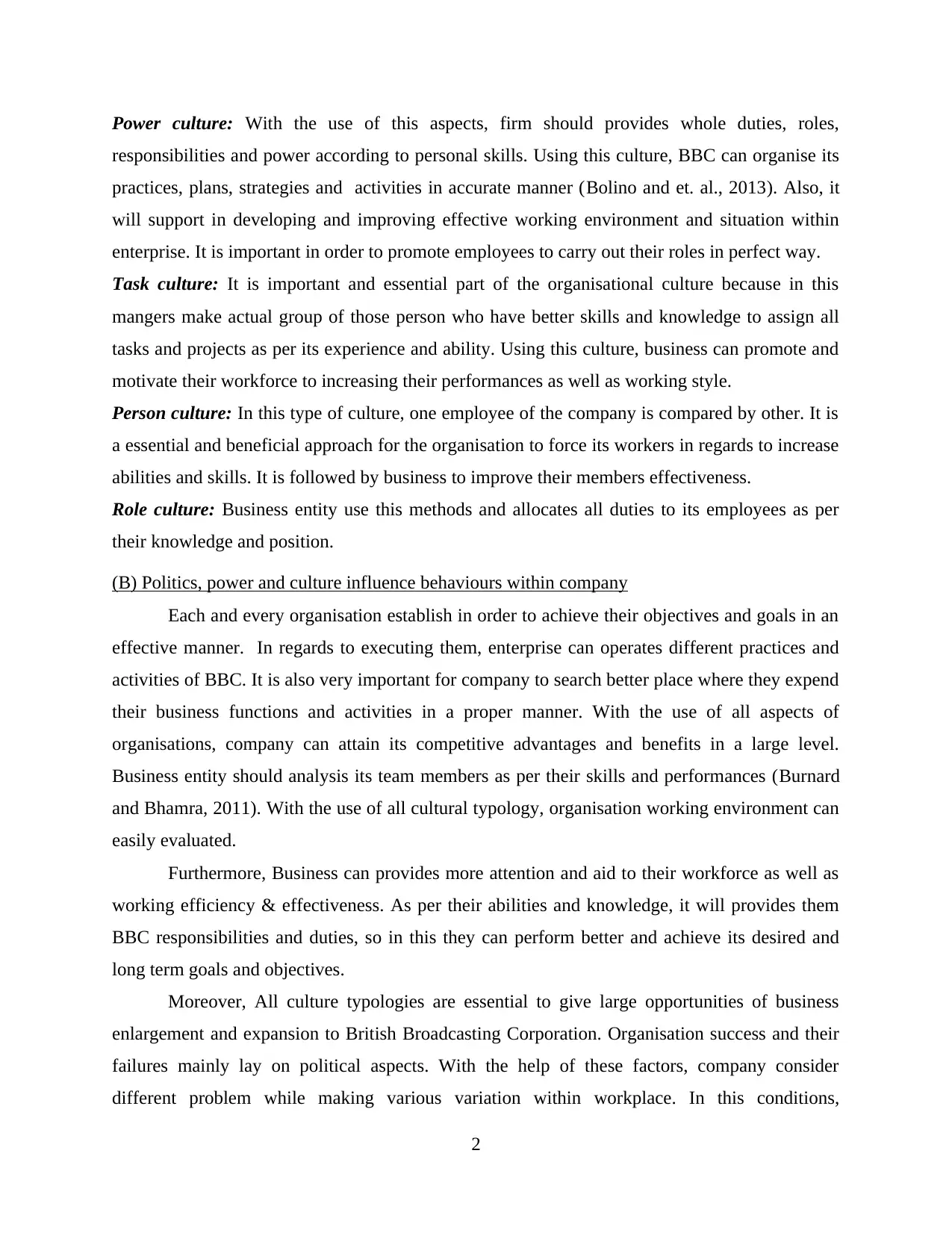
Power culture: With the use of this aspects, firm should provides whole duties, roles,
responsibilities and power according to personal skills. Using this culture, BBC can organise its
practices, plans, strategies and activities in accurate manner (Bolino and et. al., 2013). Also, it
will support in developing and improving effective working environment and situation within
enterprise. It is important in order to promote employees to carry out their roles in perfect way.
Task culture: It is important and essential part of the organisational culture because in this
mangers make actual group of those person who have better skills and knowledge to assign all
tasks and projects as per its experience and ability. Using this culture, business can promote and
motivate their workforce to increasing their performances as well as working style.
Person culture: In this type of culture, one employee of the company is compared by other. It is
a essential and beneficial approach for the organisation to force its workers in regards to increase
abilities and skills. It is followed by business to improve their members effectiveness.
Role culture: Business entity use this methods and allocates all duties to its employees as per
their knowledge and position.
(B) Politics, power and culture influence behaviours within company
Each and every organisation establish in order to achieve their objectives and goals in an
effective manner. In regards to executing them, enterprise can operates different practices and
activities of BBC. It is also very important for company to search better place where they expend
their business functions and activities in a proper manner. With the use of all aspects of
organisations, company can attain its competitive advantages and benefits in a large level.
Business entity should analysis its team members as per their skills and performances (Burnard
and Bhamra, 2011). With the use of all cultural typology, organisation working environment can
easily evaluated.
Furthermore, Business can provides more attention and aid to their workforce as well as
working efficiency & effectiveness. As per their abilities and knowledge, it will provides them
BBC responsibilities and duties, so in this they can perform better and achieve its desired and
long term goals and objectives.
Moreover, All culture typologies are essential to give large opportunities of business
enlargement and expansion to British Broadcasting Corporation. Organisation success and their
failures mainly lay on political aspects. With the help of these factors, company consider
different problem while making various variation within workplace. In this conditions,
2
responsibilities and power according to personal skills. Using this culture, BBC can organise its
practices, plans, strategies and activities in accurate manner (Bolino and et. al., 2013). Also, it
will support in developing and improving effective working environment and situation within
enterprise. It is important in order to promote employees to carry out their roles in perfect way.
Task culture: It is important and essential part of the organisational culture because in this
mangers make actual group of those person who have better skills and knowledge to assign all
tasks and projects as per its experience and ability. Using this culture, business can promote and
motivate their workforce to increasing their performances as well as working style.
Person culture: In this type of culture, one employee of the company is compared by other. It is
a essential and beneficial approach for the organisation to force its workers in regards to increase
abilities and skills. It is followed by business to improve their members effectiveness.
Role culture: Business entity use this methods and allocates all duties to its employees as per
their knowledge and position.
(B) Politics, power and culture influence behaviours within company
Each and every organisation establish in order to achieve their objectives and goals in an
effective manner. In regards to executing them, enterprise can operates different practices and
activities of BBC. It is also very important for company to search better place where they expend
their business functions and activities in a proper manner. With the use of all aspects of
organisations, company can attain its competitive advantages and benefits in a large level.
Business entity should analysis its team members as per their skills and performances (Burnard
and Bhamra, 2011). With the use of all cultural typology, organisation working environment can
easily evaluated.
Furthermore, Business can provides more attention and aid to their workforce as well as
working efficiency & effectiveness. As per their abilities and knowledge, it will provides them
BBC responsibilities and duties, so in this they can perform better and achieve its desired and
long term goals and objectives.
Moreover, All culture typologies are essential to give large opportunities of business
enlargement and expansion to British Broadcasting Corporation. Organisation success and their
failures mainly lay on political aspects. With the help of these factors, company consider
different problem while making various variation within workplace. In this conditions,
2
Paraphrase This Document
Need a fresh take? Get an instant paraphrase of this document with our AI Paraphraser
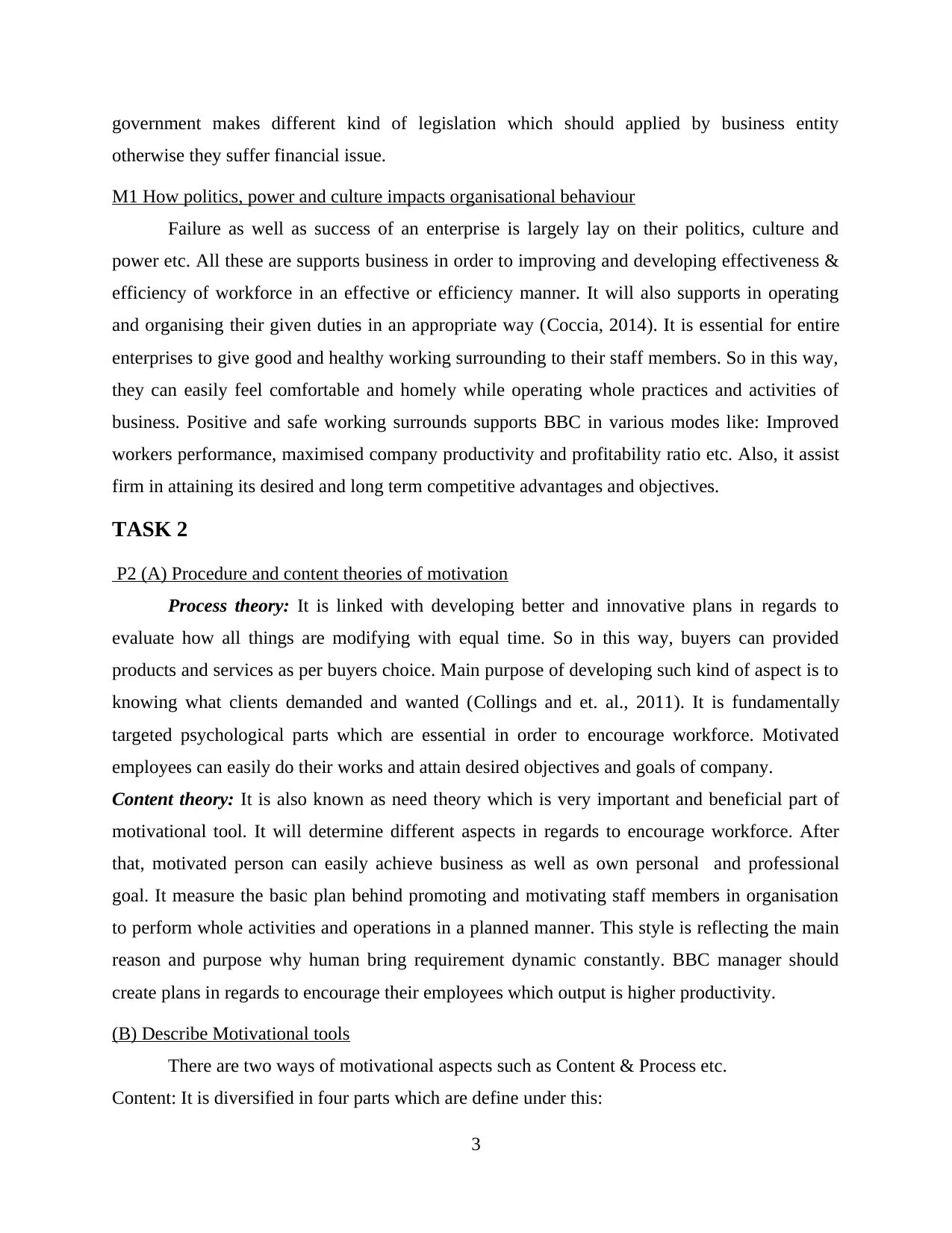
government makes different kind of legislation which should applied by business entity
otherwise they suffer financial issue.
M1 How politics, power and culture impacts organisational behaviour
Failure as well as success of an enterprise is largely lay on their politics, culture and
power etc. All these are supports business in order to improving and developing effectiveness &
efficiency of workforce in an effective or efficiency manner. It will also supports in operating
and organising their given duties in an appropriate way (Coccia, 2014). It is essential for entire
enterprises to give good and healthy working surrounding to their staff members. So in this way,
they can easily feel comfortable and homely while operating whole practices and activities of
business. Positive and safe working surrounds supports BBC in various modes like: Improved
workers performance, maximised company productivity and profitability ratio etc. Also, it assist
firm in attaining its desired and long term competitive advantages and objectives.
TASK 2
P2 (A) Procedure and content theories of motivation
Process theory: It is linked with developing better and innovative plans in regards to
evaluate how all things are modifying with equal time. So in this way, buyers can provided
products and services as per buyers choice. Main purpose of developing such kind of aspect is to
knowing what clients demanded and wanted (Collings and et. al., 2011). It is fundamentally
targeted psychological parts which are essential in order to encourage workforce. Motivated
employees can easily do their works and attain desired objectives and goals of company.
Content theory: It is also known as need theory which is very important and beneficial part of
motivational tool. It will determine different aspects in regards to encourage workforce. After
that, motivated person can easily achieve business as well as own personal and professional
goal. It measure the basic plan behind promoting and motivating staff members in organisation
to perform whole activities and operations in a planned manner. This style is reflecting the main
reason and purpose why human bring requirement dynamic constantly. BBC manager should
create plans in regards to encourage their employees which output is higher productivity.
(B) Describe Motivational tools
There are two ways of motivational aspects such as Content & Process etc.
Content: It is diversified in four parts which are define under this:
3
otherwise they suffer financial issue.
M1 How politics, power and culture impacts organisational behaviour
Failure as well as success of an enterprise is largely lay on their politics, culture and
power etc. All these are supports business in order to improving and developing effectiveness &
efficiency of workforce in an effective or efficiency manner. It will also supports in operating
and organising their given duties in an appropriate way (Coccia, 2014). It is essential for entire
enterprises to give good and healthy working surrounding to their staff members. So in this way,
they can easily feel comfortable and homely while operating whole practices and activities of
business. Positive and safe working surrounds supports BBC in various modes like: Improved
workers performance, maximised company productivity and profitability ratio etc. Also, it assist
firm in attaining its desired and long term competitive advantages and objectives.
TASK 2
P2 (A) Procedure and content theories of motivation
Process theory: It is linked with developing better and innovative plans in regards to
evaluate how all things are modifying with equal time. So in this way, buyers can provided
products and services as per buyers choice. Main purpose of developing such kind of aspect is to
knowing what clients demanded and wanted (Collings and et. al., 2011). It is fundamentally
targeted psychological parts which are essential in order to encourage workforce. Motivated
employees can easily do their works and attain desired objectives and goals of company.
Content theory: It is also known as need theory which is very important and beneficial part of
motivational tool. It will determine different aspects in regards to encourage workforce. After
that, motivated person can easily achieve business as well as own personal and professional
goal. It measure the basic plan behind promoting and motivating staff members in organisation
to perform whole activities and operations in a planned manner. This style is reflecting the main
reason and purpose why human bring requirement dynamic constantly. BBC manager should
create plans in regards to encourage their employees which output is higher productivity.
(B) Describe Motivational tools
There are two ways of motivational aspects such as Content & Process etc.
Content: It is diversified in four parts which are define under this:
3
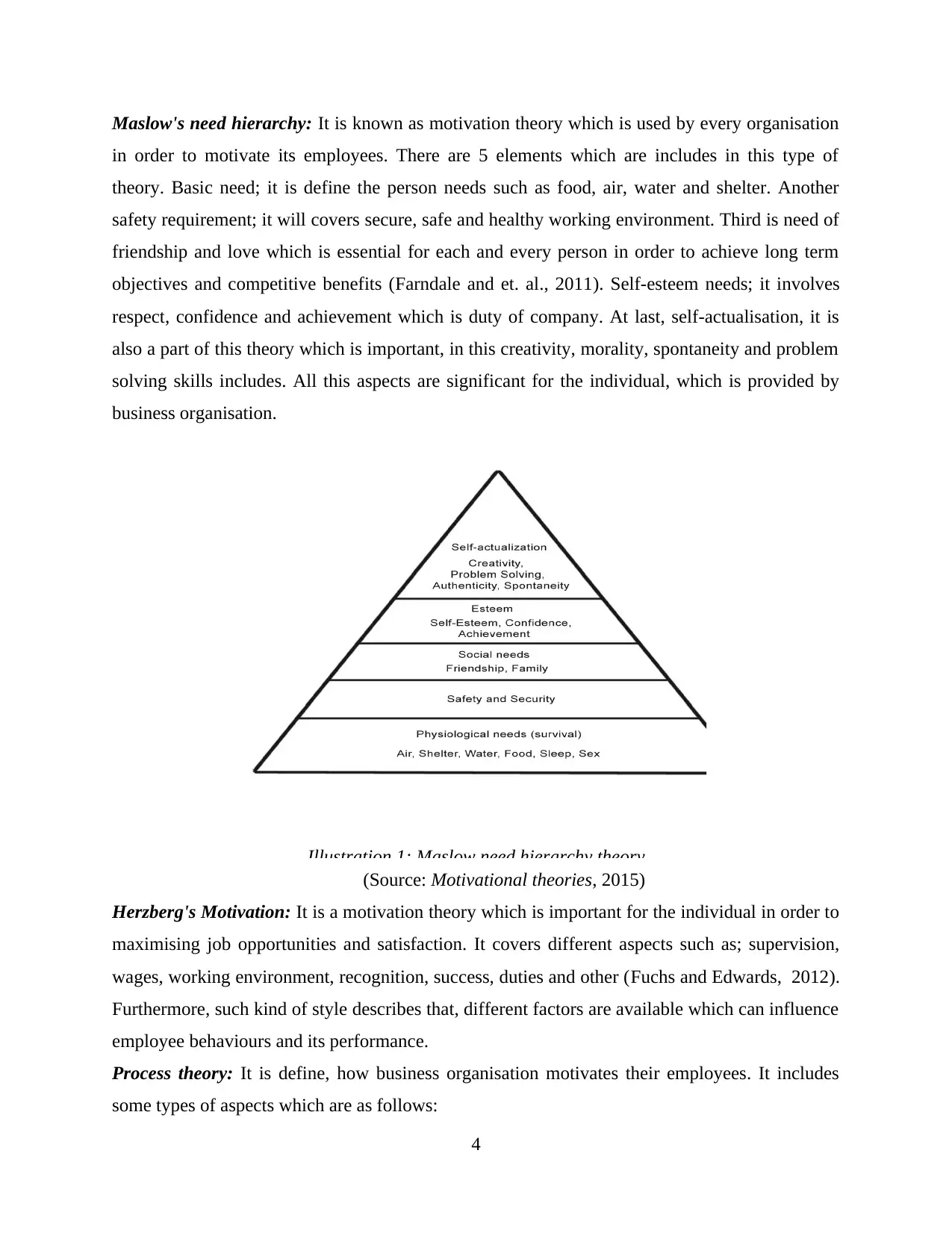
Maslow's need hierarchy: It is known as motivation theory which is used by every organisation
in order to motivate its employees. There are 5 elements which are includes in this type of
theory. Basic need; it is define the person needs such as food, air, water and shelter. Another
safety requirement; it will covers secure, safe and healthy working environment. Third is need of
friendship and love which is essential for each and every person in order to achieve long term
objectives and competitive benefits (Farndale and et. al., 2011). Self-esteem needs; it involves
respect, confidence and achievement which is duty of company. At last, self-actualisation, it is
also a part of this theory which is important, in this creativity, morality, spontaneity and problem
solving skills includes. All this aspects are significant for the individual, which is provided by
business organisation.
Illustration 1: Maslow need hierarchy theory
(Source: Motivational theories, 2015)
Herzberg's Motivation: It is a motivation theory which is important for the individual in order to
maximising job opportunities and satisfaction. It covers different aspects such as; supervision,
wages, working environment, recognition, success, duties and other (Fuchs and Edwards, 2012).
Furthermore, such kind of style describes that, different factors are available which can influence
employee behaviours and its performance.
Process theory: It is define, how business organisation motivates their employees. It includes
some types of aspects which are as follows:
4
in order to motivate its employees. There are 5 elements which are includes in this type of
theory. Basic need; it is define the person needs such as food, air, water and shelter. Another
safety requirement; it will covers secure, safe and healthy working environment. Third is need of
friendship and love which is essential for each and every person in order to achieve long term
objectives and competitive benefits (Farndale and et. al., 2011). Self-esteem needs; it involves
respect, confidence and achievement which is duty of company. At last, self-actualisation, it is
also a part of this theory which is important, in this creativity, morality, spontaneity and problem
solving skills includes. All this aspects are significant for the individual, which is provided by
business organisation.
Illustration 1: Maslow need hierarchy theory
(Source: Motivational theories, 2015)
Herzberg's Motivation: It is a motivation theory which is important for the individual in order to
maximising job opportunities and satisfaction. It covers different aspects such as; supervision,
wages, working environment, recognition, success, duties and other (Fuchs and Edwards, 2012).
Furthermore, such kind of style describes that, different factors are available which can influence
employee behaviours and its performance.
Process theory: It is define, how business organisation motivates their employees. It includes
some types of aspects which are as follows:
4
⊘ This is a preview!⊘
Do you want full access?
Subscribe today to unlock all pages.

Trusted by 1+ million students worldwide
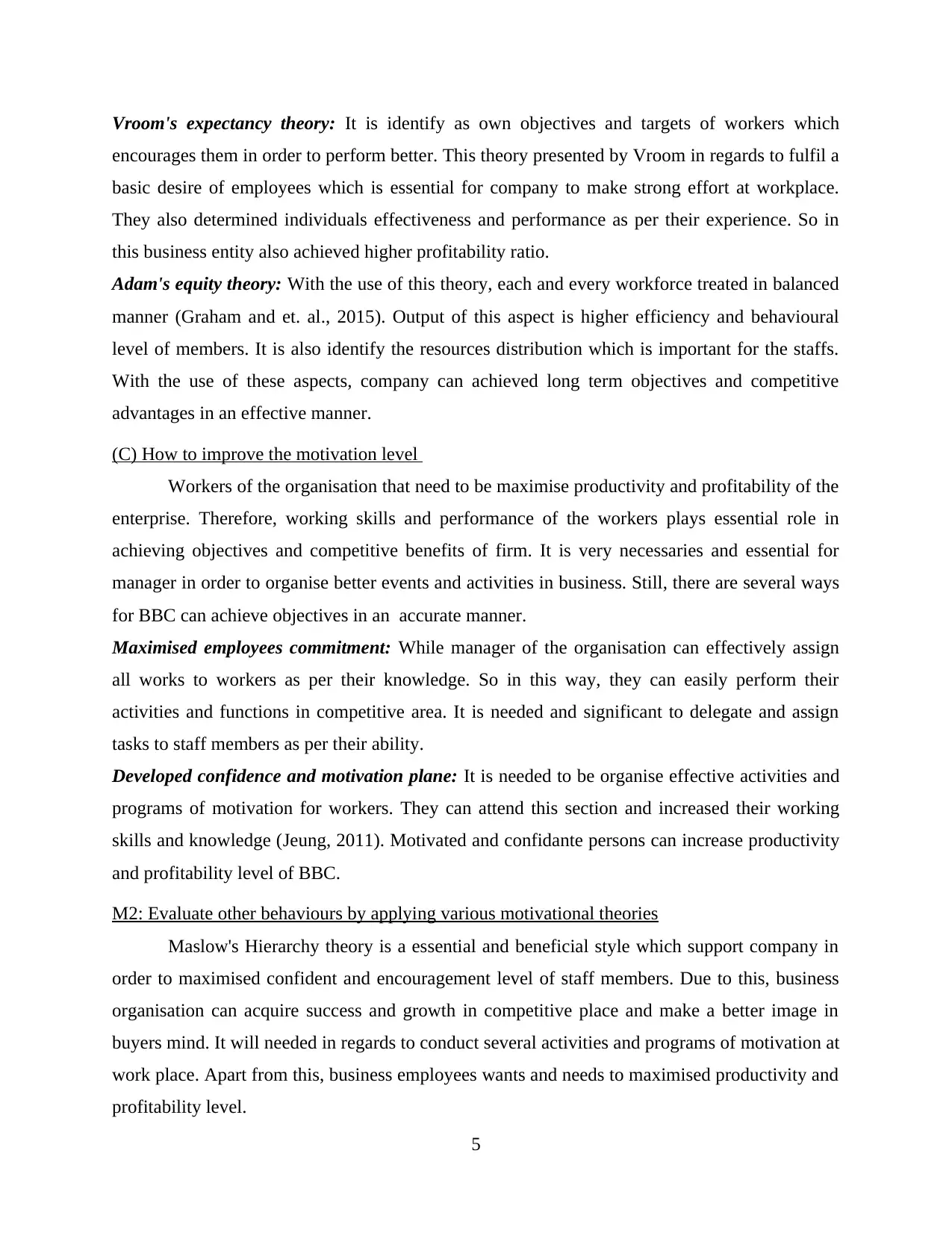
Vroom's expectancy theory: It is identify as own objectives and targets of workers which
encourages them in order to perform better. This theory presented by Vroom in regards to fulfil a
basic desire of employees which is essential for company to make strong effort at workplace.
They also determined individuals effectiveness and performance as per their experience. So in
this business entity also achieved higher profitability ratio.
Adam's equity theory: With the use of this theory, each and every workforce treated in balanced
manner (Graham and et. al., 2015). Output of this aspect is higher efficiency and behavioural
level of members. It is also identify the resources distribution which is important for the staffs.
With the use of these aspects, company can achieved long term objectives and competitive
advantages in an effective manner.
(C) How to improve the motivation level
Workers of the organisation that need to be maximise productivity and profitability of the
enterprise. Therefore, working skills and performance of the workers plays essential role in
achieving objectives and competitive benefits of firm. It is very necessaries and essential for
manager in order to organise better events and activities in business. Still, there are several ways
for BBC can achieve objectives in an accurate manner.
Maximised employees commitment: While manager of the organisation can effectively assign
all works to workers as per their knowledge. So in this way, they can easily perform their
activities and functions in competitive area. It is needed and significant to delegate and assign
tasks to staff members as per their ability.
Developed confidence and motivation plane: It is needed to be organise effective activities and
programs of motivation for workers. They can attend this section and increased their working
skills and knowledge (Jeung, 2011). Motivated and confidante persons can increase productivity
and profitability level of BBC.
M2: Evaluate other behaviours by applying various motivational theories
Maslow's Hierarchy theory is a essential and beneficial style which support company in
order to maximised confident and encouragement level of staff members. Due to this, business
organisation can acquire success and growth in competitive place and make a better image in
buyers mind. It will needed in regards to conduct several activities and programs of motivation at
work place. Apart from this, business employees wants and needs to maximised productivity and
profitability level.
5
encourages them in order to perform better. This theory presented by Vroom in regards to fulfil a
basic desire of employees which is essential for company to make strong effort at workplace.
They also determined individuals effectiveness and performance as per their experience. So in
this business entity also achieved higher profitability ratio.
Adam's equity theory: With the use of this theory, each and every workforce treated in balanced
manner (Graham and et. al., 2015). Output of this aspect is higher efficiency and behavioural
level of members. It is also identify the resources distribution which is important for the staffs.
With the use of these aspects, company can achieved long term objectives and competitive
advantages in an effective manner.
(C) How to improve the motivation level
Workers of the organisation that need to be maximise productivity and profitability of the
enterprise. Therefore, working skills and performance of the workers plays essential role in
achieving objectives and competitive benefits of firm. It is very necessaries and essential for
manager in order to organise better events and activities in business. Still, there are several ways
for BBC can achieve objectives in an accurate manner.
Maximised employees commitment: While manager of the organisation can effectively assign
all works to workers as per their knowledge. So in this way, they can easily perform their
activities and functions in competitive area. It is needed and significant to delegate and assign
tasks to staff members as per their ability.
Developed confidence and motivation plane: It is needed to be organise effective activities and
programs of motivation for workers. They can attend this section and increased their working
skills and knowledge (Jeung, 2011). Motivated and confidante persons can increase productivity
and profitability level of BBC.
M2: Evaluate other behaviours by applying various motivational theories
Maslow's Hierarchy theory is a essential and beneficial style which support company in
order to maximised confident and encouragement level of staff members. Due to this, business
organisation can acquire success and growth in competitive place and make a better image in
buyers mind. It will needed in regards to conduct several activities and programs of motivation at
work place. Apart from this, business employees wants and needs to maximised productivity and
profitability level.
5
Paraphrase This Document
Need a fresh take? Get an instant paraphrase of this document with our AI Paraphraser
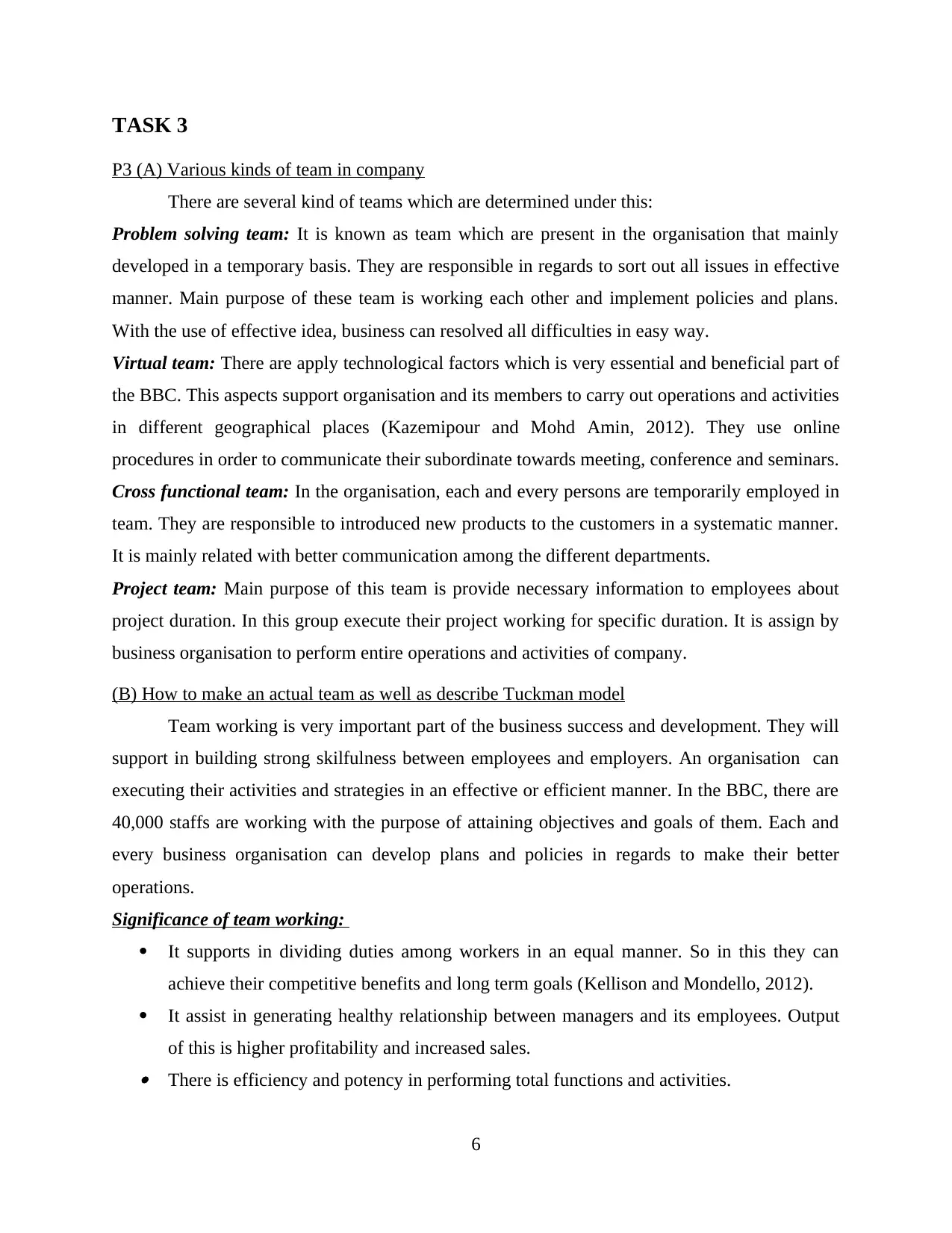
TASK 3
P3 (A) Various kinds of team in company
There are several kind of teams which are determined under this:
Problem solving team: It is known as team which are present in the organisation that mainly
developed in a temporary basis. They are responsible in regards to sort out all issues in effective
manner. Main purpose of these team is working each other and implement policies and plans.
With the use of effective idea, business can resolved all difficulties in easy way.
Virtual team: There are apply technological factors which is very essential and beneficial part of
the BBC. This aspects support organisation and its members to carry out operations and activities
in different geographical places (Kazemipour and Mohd Amin, 2012). They use online
procedures in order to communicate their subordinate towards meeting, conference and seminars.
Cross functional team: In the organisation, each and every persons are temporarily employed in
team. They are responsible to introduced new products to the customers in a systematic manner.
It is mainly related with better communication among the different departments.
Project team: Main purpose of this team is provide necessary information to employees about
project duration. In this group execute their project working for specific duration. It is assign by
business organisation to perform entire operations and activities of company.
(B) How to make an actual team as well as describe Tuckman model
Team working is very important part of the business success and development. They will
support in building strong skilfulness between employees and employers. An organisation can
executing their activities and strategies in an effective or efficient manner. In the BBC, there are
40,000 staffs are working with the purpose of attaining objectives and goals of them. Each and
every business organisation can develop plans and policies in regards to make their better
operations.
Significance of team working:
It supports in dividing duties among workers in an equal manner. So in this they can
achieve their competitive benefits and long term goals (Kellison and Mondello, 2012).
It assist in generating healthy relationship between managers and its employees. Output
of this is higher profitability and increased sales. There is efficiency and potency in performing total functions and activities.
6
P3 (A) Various kinds of team in company
There are several kind of teams which are determined under this:
Problem solving team: It is known as team which are present in the organisation that mainly
developed in a temporary basis. They are responsible in regards to sort out all issues in effective
manner. Main purpose of these team is working each other and implement policies and plans.
With the use of effective idea, business can resolved all difficulties in easy way.
Virtual team: There are apply technological factors which is very essential and beneficial part of
the BBC. This aspects support organisation and its members to carry out operations and activities
in different geographical places (Kazemipour and Mohd Amin, 2012). They use online
procedures in order to communicate their subordinate towards meeting, conference and seminars.
Cross functional team: In the organisation, each and every persons are temporarily employed in
team. They are responsible to introduced new products to the customers in a systematic manner.
It is mainly related with better communication among the different departments.
Project team: Main purpose of this team is provide necessary information to employees about
project duration. In this group execute their project working for specific duration. It is assign by
business organisation to perform entire operations and activities of company.
(B) How to make an actual team as well as describe Tuckman model
Team working is very important part of the business success and development. They will
support in building strong skilfulness between employees and employers. An organisation can
executing their activities and strategies in an effective or efficient manner. In the BBC, there are
40,000 staffs are working with the purpose of attaining objectives and goals of them. Each and
every business organisation can develop plans and policies in regards to make their better
operations.
Significance of team working:
It supports in dividing duties among workers in an equal manner. So in this they can
achieve their competitive benefits and long term goals (Kellison and Mondello, 2012).
It assist in generating healthy relationship between managers and its employees. Output
of this is higher profitability and increased sales. There is efficiency and potency in performing total functions and activities.
6
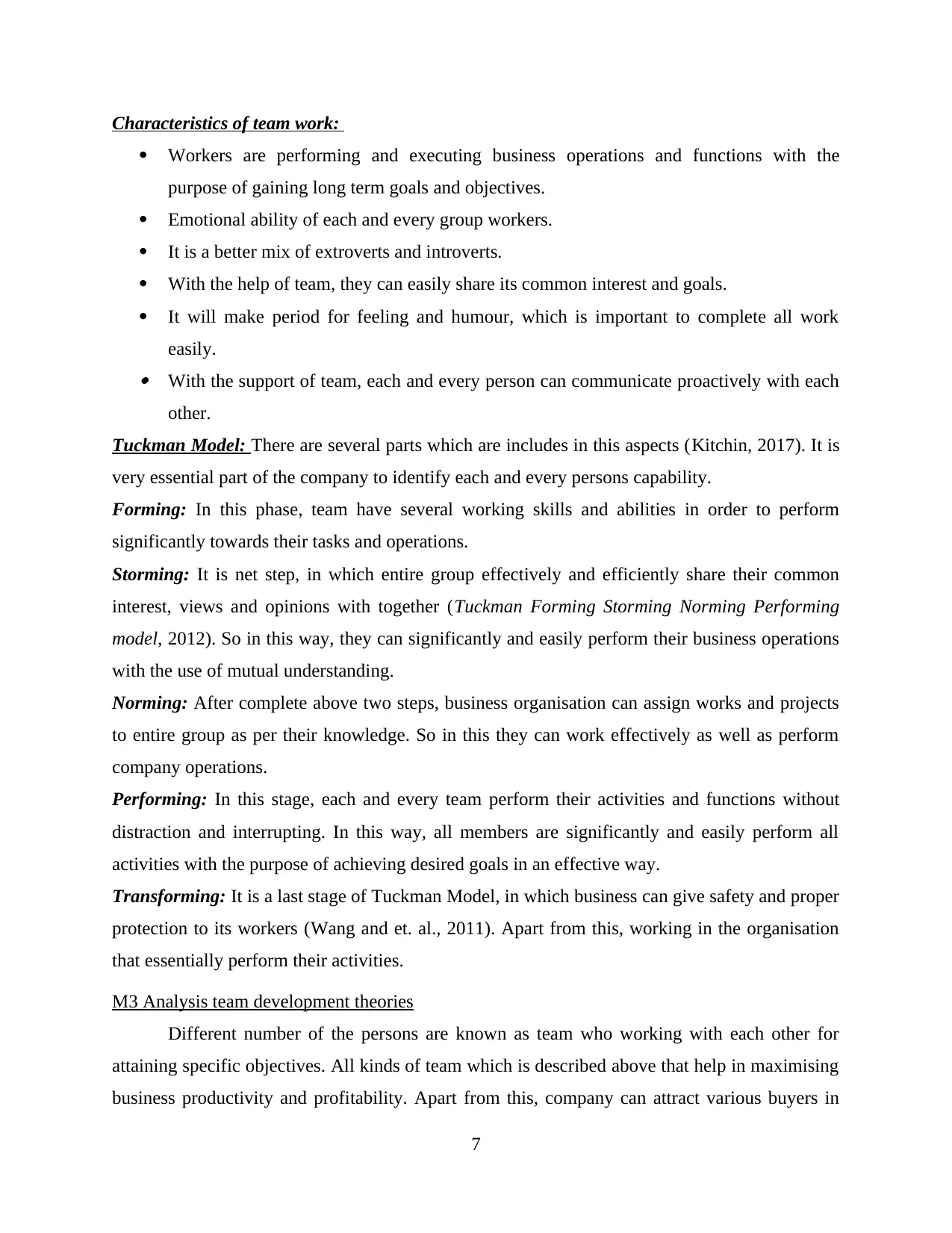
Characteristics of team work:
Workers are performing and executing business operations and functions with the
purpose of gaining long term goals and objectives.
Emotional ability of each and every group workers.
It is a better mix of extroverts and introverts.
With the help of team, they can easily share its common interest and goals.
It will make period for feeling and humour, which is important to complete all work
easily. With the support of team, each and every person can communicate proactively with each
other.
Tuckman Model: There are several parts which are includes in this aspects (Kitchin, 2017). It is
very essential part of the company to identify each and every persons capability.
Forming: In this phase, team have several working skills and abilities in order to perform
significantly towards their tasks and operations.
Storming: It is net step, in which entire group effectively and efficiently share their common
interest, views and opinions with together (Tuckman Forming Storming Norming Performing
model, 2012). So in this way, they can significantly and easily perform their business operations
with the use of mutual understanding.
Norming: After complete above two steps, business organisation can assign works and projects
to entire group as per their knowledge. So in this they can work effectively as well as perform
company operations.
Performing: In this stage, each and every team perform their activities and functions without
distraction and interrupting. In this way, all members are significantly and easily perform all
activities with the purpose of achieving desired goals in an effective way.
Transforming: It is a last stage of Tuckman Model, in which business can give safety and proper
protection to its workers (Wang and et. al., 2011). Apart from this, working in the organisation
that essentially perform their activities.
M3 Analysis team development theories
Different number of the persons are known as team who working with each other for
attaining specific objectives. All kinds of team which is described above that help in maximising
business productivity and profitability. Apart from this, company can attract various buyers in
7
Workers are performing and executing business operations and functions with the
purpose of gaining long term goals and objectives.
Emotional ability of each and every group workers.
It is a better mix of extroverts and introverts.
With the help of team, they can easily share its common interest and goals.
It will make period for feeling and humour, which is important to complete all work
easily. With the support of team, each and every person can communicate proactively with each
other.
Tuckman Model: There are several parts which are includes in this aspects (Kitchin, 2017). It is
very essential part of the company to identify each and every persons capability.
Forming: In this phase, team have several working skills and abilities in order to perform
significantly towards their tasks and operations.
Storming: It is net step, in which entire group effectively and efficiently share their common
interest, views and opinions with together (Tuckman Forming Storming Norming Performing
model, 2012). So in this way, they can significantly and easily perform their business operations
with the use of mutual understanding.
Norming: After complete above two steps, business organisation can assign works and projects
to entire group as per their knowledge. So in this they can work effectively as well as perform
company operations.
Performing: In this stage, each and every team perform their activities and functions without
distraction and interrupting. In this way, all members are significantly and easily perform all
activities with the purpose of achieving desired goals in an effective way.
Transforming: It is a last stage of Tuckman Model, in which business can give safety and proper
protection to its workers (Wang and et. al., 2011). Apart from this, working in the organisation
that essentially perform their activities.
M3 Analysis team development theories
Different number of the persons are known as team who working with each other for
attaining specific objectives. All kinds of team which is described above that help in maximising
business productivity and profitability. Apart from this, company can attract various buyers in
7
⊘ This is a preview!⊘
Do you want full access?
Subscribe today to unlock all pages.

Trusted by 1+ million students worldwide
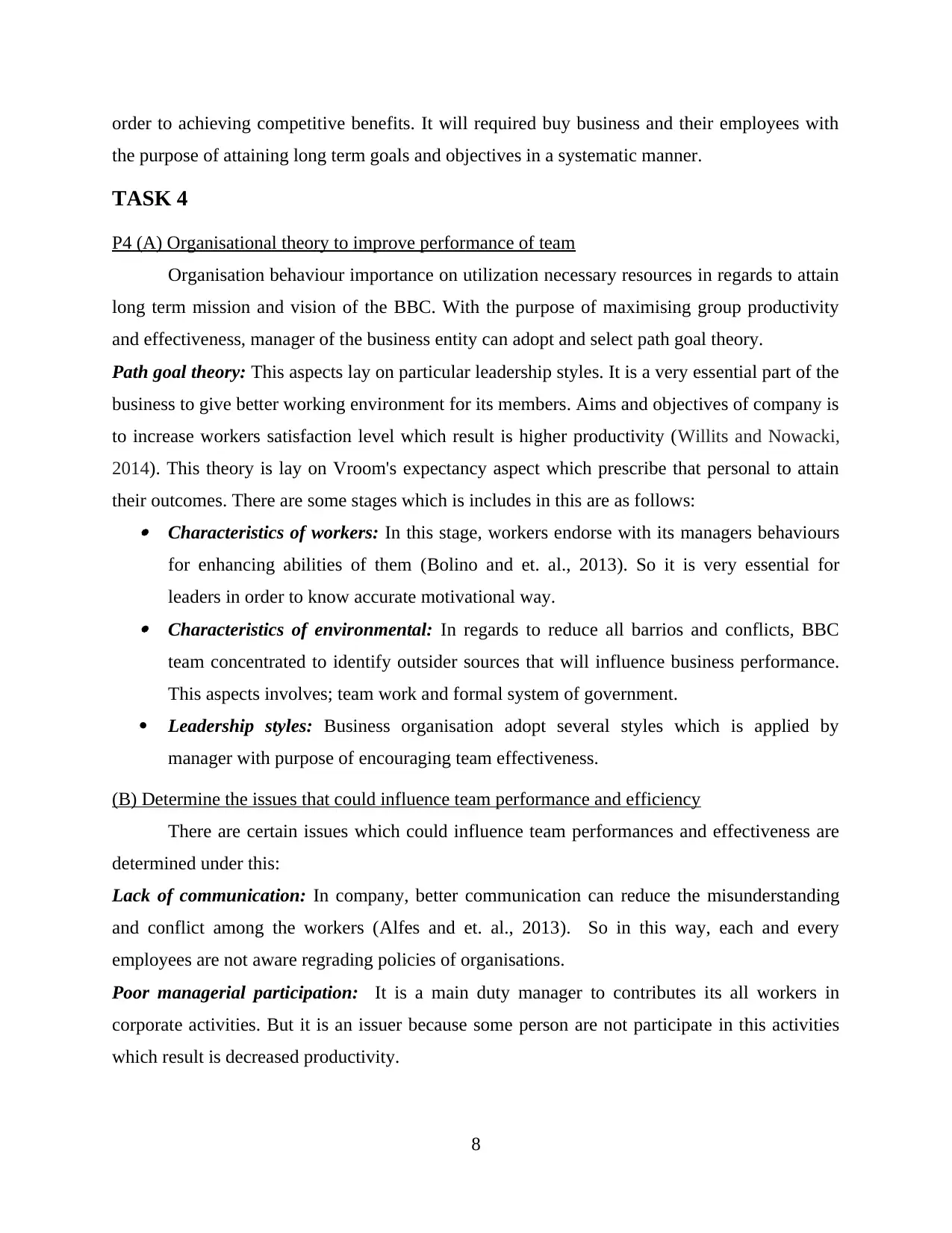
order to achieving competitive benefits. It will required buy business and their employees with
the purpose of attaining long term goals and objectives in a systematic manner.
TASK 4
P4 (A) Organisational theory to improve performance of team
Organisation behaviour importance on utilization necessary resources in regards to attain
long term mission and vision of the BBC. With the purpose of maximising group productivity
and effectiveness, manager of the business entity can adopt and select path goal theory.
Path goal theory: This aspects lay on particular leadership styles. It is a very essential part of the
business to give better working environment for its members. Aims and objectives of company is
to increase workers satisfaction level which result is higher productivity (Willits and Nowacki,
2014). This theory is lay on Vroom's expectancy aspect which prescribe that personal to attain
their outcomes. There are some stages which is includes in this are as follows: Characteristics of workers: In this stage, workers endorse with its managers behaviours
for enhancing abilities of them (Bolino and et. al., 2013). So it is very essential for
leaders in order to know accurate motivational way. Characteristics of environmental: In regards to reduce all barrios and conflicts, BBC
team concentrated to identify outsider sources that will influence business performance.
This aspects involves; team work and formal system of government.
Leadership styles: Business organisation adopt several styles which is applied by
manager with purpose of encouraging team effectiveness.
(B) Determine the issues that could influence team performance and efficiency
There are certain issues which could influence team performances and effectiveness are
determined under this:
Lack of communication: In company, better communication can reduce the misunderstanding
and conflict among the workers (Alfes and et. al., 2013). So in this way, each and every
employees are not aware regrading policies of organisations.
Poor managerial participation: It is a main duty manager to contributes its all workers in
corporate activities. But it is an issuer because some person are not participate in this activities
which result is decreased productivity.
8
the purpose of attaining long term goals and objectives in a systematic manner.
TASK 4
P4 (A) Organisational theory to improve performance of team
Organisation behaviour importance on utilization necessary resources in regards to attain
long term mission and vision of the BBC. With the purpose of maximising group productivity
and effectiveness, manager of the business entity can adopt and select path goal theory.
Path goal theory: This aspects lay on particular leadership styles. It is a very essential part of the
business to give better working environment for its members. Aims and objectives of company is
to increase workers satisfaction level which result is higher productivity (Willits and Nowacki,
2014). This theory is lay on Vroom's expectancy aspect which prescribe that personal to attain
their outcomes. There are some stages which is includes in this are as follows: Characteristics of workers: In this stage, workers endorse with its managers behaviours
for enhancing abilities of them (Bolino and et. al., 2013). So it is very essential for
leaders in order to know accurate motivational way. Characteristics of environmental: In regards to reduce all barrios and conflicts, BBC
team concentrated to identify outsider sources that will influence business performance.
This aspects involves; team work and formal system of government.
Leadership styles: Business organisation adopt several styles which is applied by
manager with purpose of encouraging team effectiveness.
(B) Determine the issues that could influence team performance and efficiency
There are certain issues which could influence team performances and effectiveness are
determined under this:
Lack of communication: In company, better communication can reduce the misunderstanding
and conflict among the workers (Alfes and et. al., 2013). So in this way, each and every
employees are not aware regrading policies of organisations.
Poor managerial participation: It is a main duty manager to contributes its all workers in
corporate activities. But it is an issuer because some person are not participate in this activities
which result is decreased productivity.
8
Paraphrase This Document
Need a fresh take? Get an instant paraphrase of this document with our AI Paraphraser
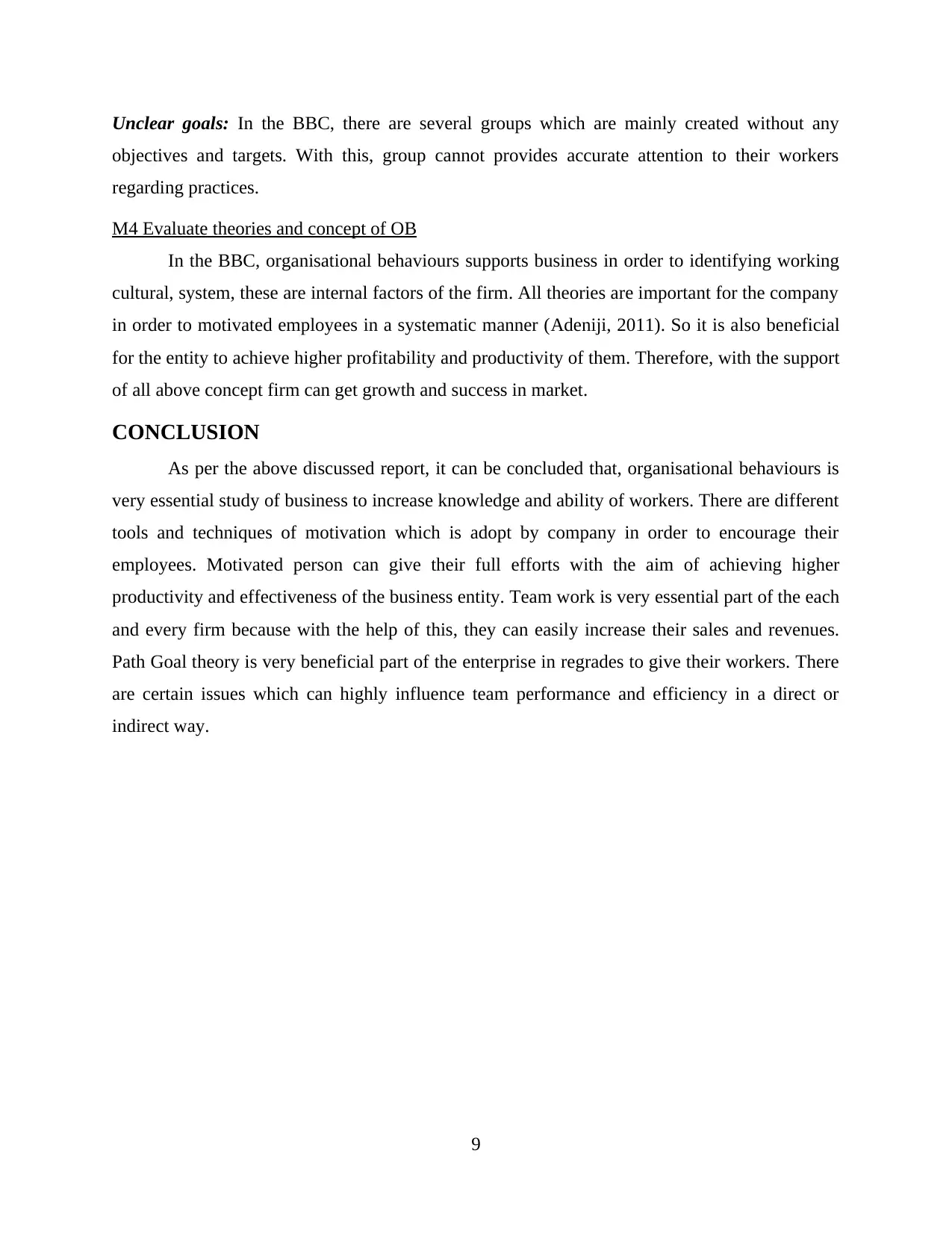
Unclear goals: In the BBC, there are several groups which are mainly created without any
objectives and targets. With this, group cannot provides accurate attention to their workers
regarding practices.
M4 Evaluate theories and concept of OB
In the BBC, organisational behaviours supports business in order to identifying working
cultural, system, these are internal factors of the firm. All theories are important for the company
in order to motivated employees in a systematic manner (Adeniji, 2011). So it is also beneficial
for the entity to achieve higher profitability and productivity of them. Therefore, with the support
of all above concept firm can get growth and success in market.
CONCLUSION
As per the above discussed report, it can be concluded that, organisational behaviours is
very essential study of business to increase knowledge and ability of workers. There are different
tools and techniques of motivation which is adopt by company in order to encourage their
employees. Motivated person can give their full efforts with the aim of achieving higher
productivity and effectiveness of the business entity. Team work is very essential part of the each
and every firm because with the help of this, they can easily increase their sales and revenues.
Path Goal theory is very beneficial part of the enterprise in regrades to give their workers. There
are certain issues which can highly influence team performance and efficiency in a direct or
indirect way.
9
objectives and targets. With this, group cannot provides accurate attention to their workers
regarding practices.
M4 Evaluate theories and concept of OB
In the BBC, organisational behaviours supports business in order to identifying working
cultural, system, these are internal factors of the firm. All theories are important for the company
in order to motivated employees in a systematic manner (Adeniji, 2011). So it is also beneficial
for the entity to achieve higher profitability and productivity of them. Therefore, with the support
of all above concept firm can get growth and success in market.
CONCLUSION
As per the above discussed report, it can be concluded that, organisational behaviours is
very essential study of business to increase knowledge and ability of workers. There are different
tools and techniques of motivation which is adopt by company in order to encourage their
employees. Motivated person can give their full efforts with the aim of achieving higher
productivity and effectiveness of the business entity. Team work is very essential part of the each
and every firm because with the help of this, they can easily increase their sales and revenues.
Path Goal theory is very beneficial part of the enterprise in regrades to give their workers. There
are certain issues which can highly influence team performance and efficiency in a direct or
indirect way.
9
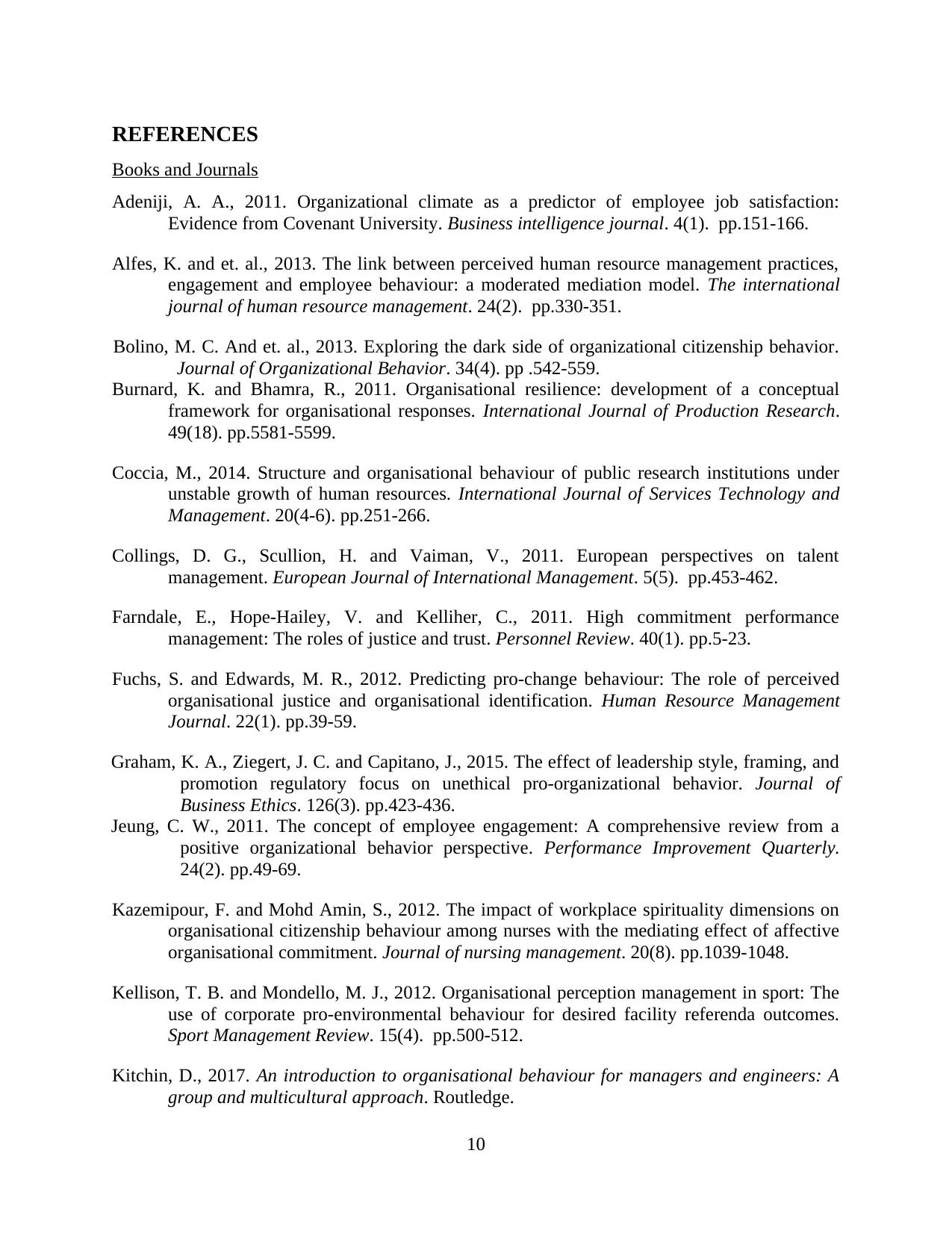
REFERENCES
Books and Journals
Adeniji, A. A., 2011. Organizational climate as a predictor of employee job satisfaction:
Evidence from Covenant University. Business intelligence journal. 4(1). pp.151-166.
Alfes, K. and et. al., 2013. The link between perceived human resource management practices,
engagement and employee behaviour: a moderated mediation model. The international
journal of human resource management. 24(2). pp.330-351.
Bolino, M. C. And et. al., 2013. Exploring the dark side of organizational citizenship behavior.
Journal of Organizational Behavior. 34(4). pp .542-559.
Burnard, K. and Bhamra, R., 2011. Organisational resilience: development of a conceptual
framework for organisational responses. International Journal of Production Research.
49(18). pp.5581-5599.
Coccia, M., 2014. Structure and organisational behaviour of public research institutions under
unstable growth of human resources. International Journal of Services Technology and
Management. 20(4-6). pp.251-266.
Collings, D. G., Scullion, H. and Vaiman, V., 2011. European perspectives on talent
management. European Journal of International Management. 5(5). pp.453-462.
Farndale, E., Hope-Hailey, V. and Kelliher, C., 2011. High commitment performance
management: The roles of justice and trust. Personnel Review. 40(1). pp.5-23.
Fuchs, S. and Edwards, M. R., 2012. Predicting pro‐change behaviour: The role of perceived
organisational justice and organisational identification. Human Resource Management
Journal. 22(1). pp.39-59.
Graham, K. A., Ziegert, J. C. and Capitano, J., 2015. The effect of leadership style, framing, and
promotion regulatory focus on unethical pro-organizational behavior. Journal of
Business Ethics. 126(3). pp.423-436.
Jeung, C. W., 2011. The concept of employee engagement: A comprehensive review from a
positive organizational behavior perspective. Performance Improvement Quarterly.
24(2). pp.49-69.
Kazemipour, F. and Mohd Amin, S., 2012. The impact of workplace spirituality dimensions on
organisational citizenship behaviour among nurses with the mediating effect of affective
organisational commitment. Journal of nursing management. 20(8). pp.1039-1048.
Kellison, T. B. and Mondello, M. J., 2012. Organisational perception management in sport: The
use of corporate pro-environmental behaviour for desired facility referenda outcomes.
Sport Management Review. 15(4). pp.500-512.
Kitchin, D., 2017. An introduction to organisational behaviour for managers and engineers: A
group and multicultural approach. Routledge.
10
Books and Journals
Adeniji, A. A., 2011. Organizational climate as a predictor of employee job satisfaction:
Evidence from Covenant University. Business intelligence journal. 4(1). pp.151-166.
Alfes, K. and et. al., 2013. The link between perceived human resource management practices,
engagement and employee behaviour: a moderated mediation model. The international
journal of human resource management. 24(2). pp.330-351.
Bolino, M. C. And et. al., 2013. Exploring the dark side of organizational citizenship behavior.
Journal of Organizational Behavior. 34(4). pp .542-559.
Burnard, K. and Bhamra, R., 2011. Organisational resilience: development of a conceptual
framework for organisational responses. International Journal of Production Research.
49(18). pp.5581-5599.
Coccia, M., 2014. Structure and organisational behaviour of public research institutions under
unstable growth of human resources. International Journal of Services Technology and
Management. 20(4-6). pp.251-266.
Collings, D. G., Scullion, H. and Vaiman, V., 2011. European perspectives on talent
management. European Journal of International Management. 5(5). pp.453-462.
Farndale, E., Hope-Hailey, V. and Kelliher, C., 2011. High commitment performance
management: The roles of justice and trust. Personnel Review. 40(1). pp.5-23.
Fuchs, S. and Edwards, M. R., 2012. Predicting pro‐change behaviour: The role of perceived
organisational justice and organisational identification. Human Resource Management
Journal. 22(1). pp.39-59.
Graham, K. A., Ziegert, J. C. and Capitano, J., 2015. The effect of leadership style, framing, and
promotion regulatory focus on unethical pro-organizational behavior. Journal of
Business Ethics. 126(3). pp.423-436.
Jeung, C. W., 2011. The concept of employee engagement: A comprehensive review from a
positive organizational behavior perspective. Performance Improvement Quarterly.
24(2). pp.49-69.
Kazemipour, F. and Mohd Amin, S., 2012. The impact of workplace spirituality dimensions on
organisational citizenship behaviour among nurses with the mediating effect of affective
organisational commitment. Journal of nursing management. 20(8). pp.1039-1048.
Kellison, T. B. and Mondello, M. J., 2012. Organisational perception management in sport: The
use of corporate pro-environmental behaviour for desired facility referenda outcomes.
Sport Management Review. 15(4). pp.500-512.
Kitchin, D., 2017. An introduction to organisational behaviour for managers and engineers: A
group and multicultural approach. Routledge.
10
⊘ This is a preview!⊘
Do you want full access?
Subscribe today to unlock all pages.

Trusted by 1+ million students worldwide
1 out of 13
Related Documents
Your All-in-One AI-Powered Toolkit for Academic Success.
+13062052269
info@desklib.com
Available 24*7 on WhatsApp / Email
![[object Object]](/_next/static/media/star-bottom.7253800d.svg)
Unlock your academic potential
Copyright © 2020–2026 A2Z Services. All Rights Reserved. Developed and managed by ZUCOL.





